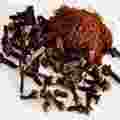Cloves are an ancient spice and, because of their exceptional aromatic strength, have always been held in high esteem by cooks in Europe, Northern Africa the greater part of Asia.
Trade between the «clove island» Ternate and China goes back at least 2500 years. In China, cloves were not only used for cooking but also for deodorization; anyone having an audience with the emperor had to chew cloves to prevent any undesired smell. Arab traders brought cloves to Europe in the time of the Romans; they were very expensive.
When the Europeans, in the Age of Exploration, finally found the clove producing islands, they took enormous interest in securing a constant spice supply: The few tourists visiting the small island of Ternate (9 km diameter) will be surprised to find crumbling remnants of about 10 fortresses, built by Portuguese, Spanish, British and finally Dutch soldiers in the 16. th and early 17. th century. During all of the 17. th century, the Dutch kept an effective monopoly in the clove trade, which guaranteed high profits to them.
Origin
The clove tree is endemic in the North Moluccas (Indonesia) and was of old cultivated on the islands of Ternate, Tidore, Bacan and the West coast of Halmahera. The Dutch extended cultivation to several other islands in the Moluccas, but only after the end of the Dutch monopoly (18. th century), clove trees were introduced to other countries.
Sensory quality
Strongly aromatic and very intensive fragrance; fiery and burning taste.

